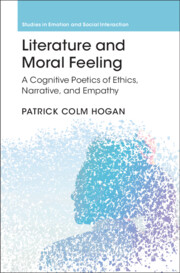Book contents
- Literature and Moral Feeling
- Studies in Emotion and Social Interaction
- Literature and Moral Feeling
- Copyright page
- Dedication
- Contents
- Figures
- Acknowledgments
- Introduction:
- Chapter 1 Defining Ethics
- Chapter 2 The Implied Ethics of Julius Caesar
- Chapter 3 Narrative Universals, Emotion, and Ethics
- Chapter 4 Ethics and Narrative Genre:
- Chapter 5 Emotion and Empathy
- Chapter 6 The Dynamics of Empathic Response:
- Chapter 7 Evaluating Empathy
- Chapter 8 The Critical Empathy of Angels in America
- Afterword:
- References
- Index
- Studies in Emotion and Social Interaction
Chapter 2 - The Implied Ethics of Julius Caesar
Published online by Cambridge University Press: 21 April 2022
- Literature and Moral Feeling
- Studies in Emotion and Social Interaction
- Literature and Moral Feeling
- Copyright page
- Dedication
- Contents
- Figures
- Acknowledgments
- Introduction:
- Chapter 1 Defining Ethics
- Chapter 2 The Implied Ethics of Julius Caesar
- Chapter 3 Narrative Universals, Emotion, and Ethics
- Chapter 4 Ethics and Narrative Genre:
- Chapter 5 Emotion and Empathy
- Chapter 6 The Dynamics of Empathic Response:
- Chapter 7 Evaluating Empathy
- Chapter 8 The Critical Empathy of Angels in America
- Afterword:
- References
- Index
- Studies in Emotion and Social Interaction
Summary
Literary texts commonly manifest ethical attitudes. These may be represented in terms of distinct parameter settings within more widely held principles. The author is often not fully aware of the ethical views that guide his or her storytelling in this way. In addition, the implicit ethics of a work are often connected more specifically with its story genre – thus, its ethical prototype – such as the heroic usurpation story of Julius Caesar. More narrowly still, the ethical views represented in a work may have a generally trusting attitude toward the hero’s ethical self-presentation or may take a more skeptical view. I refer to the latter as a “critical ethics.” Critical ethics stresses the dissociation of a character’s rhetoric from his or her actual motivation. The second chapter develops some theoretical concepts along these lines. It goes on to concretize the first chapter’s relatively abstract treatment of ethical principles and parameters through an examination of the ethical concerns underlying characters’ judgments and behaviors in Julius Caesar.
- Type
- Chapter
- Information
- Literature and Moral FeelingA Cognitive Poetics of Ethics, Narrative, and Empathy, pp. 40 - 51Publisher: Cambridge University PressPrint publication year: 2022



